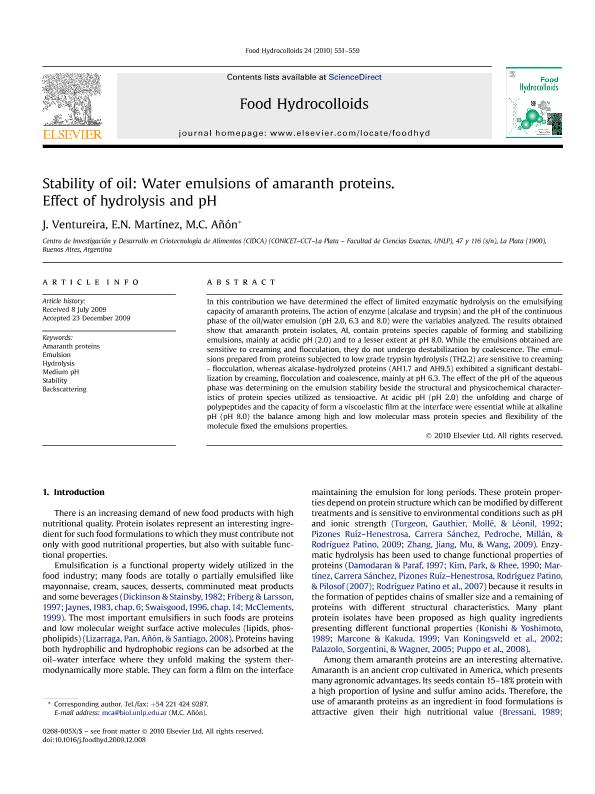Mostrar el registro sencillo del ítem
dc.contributor.author
Ventureira, Jorge Luis

dc.contributor.author
Martinez, Estela Nora

dc.contributor.author
Añon, Maria Cristina

dc.date.available
2021-07-14T12:02:03Z
dc.date.issued
2010-08
dc.identifier.citation
Ventureira, Jorge Luis; Martinez, Estela Nora; Añon, Maria Cristina; Stability of oil: Water emulsions of amaranth proteins: Effect of hydrolysis and pH; Elsevier; Food Hydrocolloids; 24; 6-7; 8-2010; 551-559
dc.identifier.issn
0268-005X
dc.identifier.uri
http://hdl.handle.net/11336/136056
dc.description.abstract
In this contribution we have determined the effect of limited enzymatic hydrolysis on the emulsifying capacity of amaranth proteins. The action of enzyme (alcalase and trypsin) and the pH of the continuous phase of the oil/water emulsion (pH 2.0, 6.3 and 8.0) were the variables analyzed. The results obtained show that amaranth protein isolates, AI, contain proteins species capable of forming and stabilizing emulsions, mainly at acidic pH (2.0) and to a lesser extent at pH 8.0. While the emulsions obtained are sensitive to creaming and flocculation, they do not undergo destabilization by coalescence. The emulsions prepared from proteins subjected to low grade trypsin hydrolysis (TH2.2) are sensitive to creaming - flocculation, whereas alcalase-hydrolyzed proteins (AH1.7 and AH9.5) exhibited a significant destabilization by creaming, flocculation and coalescence, mainly at pH 6.3. The effect of the pH of the aqueous phase was determining on the emulsion stability beside the structural and physicochemical characteristics of protein species utilized as tensioactive. At acidic pH (pH 2.0) the unfolding and charge of polypeptides and the capacity of form a viscoelastic film at the interface were essential while at alkaline pH (pH 8.0) the balance among high and low molecular mass protein species and flexibility of the molecule fixed the emulsions properties.
dc.format
application/pdf
dc.language.iso
eng
dc.publisher
Elsevier

dc.rights
info:eu-repo/semantics/openAccess
dc.rights.uri
https://creativecommons.org/licenses/by-nc-sa/2.5/ar/
dc.subject
AMARANTH PROTEINS
dc.subject
BACKSCATTERING
dc.subject
EMULSION
dc.subject
HYDROLYSIS
dc.subject
MEDIUM PH
dc.subject
STABILITY
dc.subject.classification
Alimentos y Bebidas

dc.subject.classification
Otras Ingenierías y Tecnologías

dc.subject.classification
INGENIERÍAS Y TECNOLOGÍAS

dc.title
Stability of oil: Water emulsions of amaranth proteins: Effect of hydrolysis and pH
dc.type
info:eu-repo/semantics/article
dc.type
info:ar-repo/semantics/artículo
dc.type
info:eu-repo/semantics/publishedVersion
dc.date.updated
2021-06-30T13:33:27Z
dc.identifier.eissn
1873-7137
dc.journal.volume
24
dc.journal.number
6-7
dc.journal.pagination
551-559
dc.journal.pais
Países Bajos

dc.journal.ciudad
Amsterdam
dc.description.fil
Fil: Ventureira, Jorge Luis. Provincia de Buenos Aires. Gobernación. Comisión de Investigaciones Científicas. Centro de Investigación y Desarrollo en Criotecnología de Alimentos. Consejo Nacional de Investigaciones Científicas y Técnicas. Centro Científico Tecnológico Conicet - La Plata. Centro de Investigación y Desarrollo en Criotecnología de Alimentos. Universidad Nacional de La Plata. Facultad de Ciencias Exactas. Centro de Investigación y Desarrollo en Criotecnología de Alimentos; Argentina
dc.description.fil
Fil: Martinez, Estela Nora. Provincia de Buenos Aires. Gobernación. Comisión de Investigaciones Científicas. Centro de Investigación y Desarrollo en Criotecnología de Alimentos. Consejo Nacional de Investigaciones Científicas y Técnicas. Centro Científico Tecnológico Conicet - La Plata. Centro de Investigación y Desarrollo en Criotecnología de Alimentos. Universidad Nacional de La Plata. Facultad de Ciencias Exactas. Centro de Investigación y Desarrollo en Criotecnología de Alimentos; Argentina
dc.description.fil
Fil: Añon, Maria Cristina. Provincia de Buenos Aires. Gobernación. Comisión de Investigaciones Científicas. Centro de Investigación y Desarrollo en Criotecnología de Alimentos. Consejo Nacional de Investigaciones Científicas y Técnicas. Centro Científico Tecnológico Conicet - La Plata. Centro de Investigación y Desarrollo en Criotecnología de Alimentos. Universidad Nacional de La Plata. Facultad de Ciencias Exactas. Centro de Investigación y Desarrollo en Criotecnología de Alimentos; Argentina
dc.journal.title
Food Hydrocolloids

dc.relation.alternativeid
info:eu-repo/semantics/altIdentifier/url/https://bit.ly/3kerdj7
dc.relation.alternativeid
info:eu-repo/semantics/altIdentifier/doi/http://dx.doi.org/10.1016/j.foodhyd.2009.12.008
Archivos asociados
